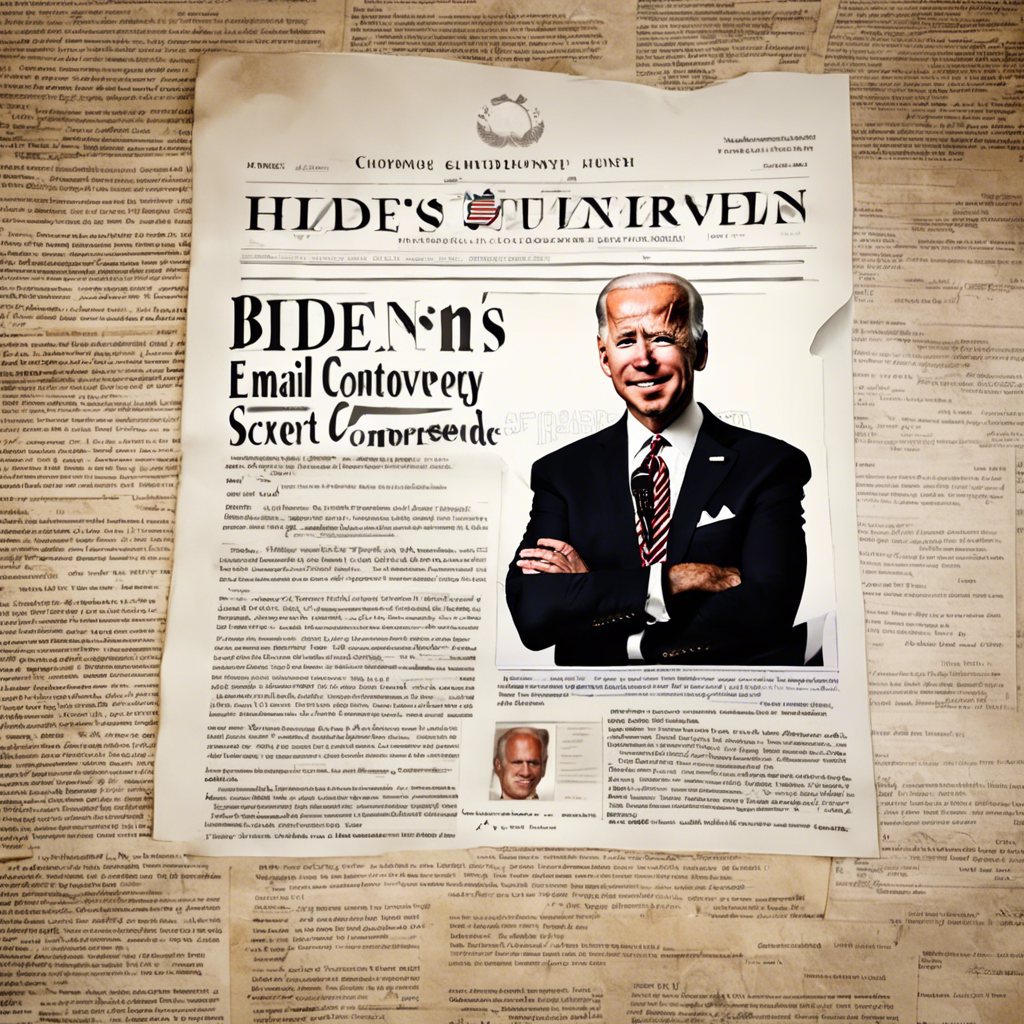Biden’s Email Controversy: Unveiling the Secret Correspondence

New records reveal Joe Biden’s use of email aliases and private addresses to communicate with his son and business associates
Former Vice President Joe Biden finds himself embroiled in a new controversy surrounding his email communications. Recent revelations from the House Ways & Means Committee show that Biden used email aliases and private addresses to correspond with his son, Hunter Biden, and Hunter’s business associates. While the extent and content of these communications remain unclear, the release of this information has sparked a fresh wave of scrutiny and speculation.
The Metadata Revealed
According to metadata obtained by the House Ways & Means Committee, Joe Biden used alias email accounts a staggering 327 times over a nine-year period, from 2010 to 2019. These emails were primarily exchanged with his son, Hunter, and Eric Schwerin, a key business associate of the Biden family. The committee highlights that 54 of these emails were exclusively between Joe Biden and Schwerin, who is described as the “architect of the Biden family’s shell companies.” The committee’s findings raise questions about the nature of these communications and their potential implications.
National Archives Hand Over Records
Following the revelation of Biden’s email usage, sources close to the matter have disclosed that the National Archives will provide the House Ways & Means Committee with over 60,000 Biden records. These records include communications conducted through email aliases. The handover of these documents signifies a significant development in the ongoing investigation and could potentially shed more light on the content and context of Biden’s emails.
Capitol Hill
In the realm of Capitol Hill, various political battles are taking place. Representative Ayanna Pressley has introduced legislation that aims to guarantee the right to vote for individuals with felonies. This move has sparked a contentious debate about the rights of convicted criminals and the potential impact on elections. Meanwhile, Senate Majority Leader Chuck Schumer has chastised a House Republican over what he deems an “antisemitic, disgusting” meme, highlighting the ongoing tensions within Congress. The NRA has also criticized Schumer’s attempt to ban so-called “assault weapons,” arguing that it would undermine citizens’ right to self-defense. Furthermore, Representatives James Comer and Jim Jordan have threatened to hold Hunter Biden in contempt of Congress for his refusal to appear at a deposition, signaling the escalating confrontation between lawmakers and the Biden family. Lastly, a GOP senator has written a scathing letter to the Department of Justice and the State Department, accusing a Washington Post writer of inciting “open rebellion” and demanding action.
White House
Within the White House, controversies and policy debates continue to unfold. A green energy project on a major US military base has been disconnected due to alleged ties to the Chinese Communist Party, raising concerns about national security. Additionally, President Biden’s billion-dollar EV charging program has come under scrutiny for its failure to build any chargers in two years, leading to accusations of wasteful spending. White House interns have rebelled against Biden, issuing a letter demanding a cease-fire in Gaza, highlighting the growing dissent within the administration. These events shed light on the challenges and complexities of governing in the current political landscape.
Tales from the Campaign Trail
On the campaign trail, political dynamics are shifting. A Democratic mega-donor has contributed $250,000 to a super PAC supporting Nikki Haley, emphasizing the role of money in shaping political landscapes. A member of the progressive “Squad” has been officially challenged by a pro-Israel primary candidate, highlighting the ongoing tensions within the Democratic Party. The decision to limit debate participation has been defended by RNC Chair Ronna McDaniel, sparking a debate about the fairness and inclusivity of the primary process. Former President Donald Trump remains active, with his focus on a crucial state and his criticism of John Kerry’s climate agenda. Trump’s recent town hall on “Hannity” has also generated significant attention, with highlights capturing the essence of his messaging and appeal.
Across America
Across America, various issues are capturing attention. A Democratic governor in Pennsylvania has criticized an Ivy League president over testimony on antisemitism, underscoring the ongoing debates surrounding this sensitive topic. Migrant encounters at the southern border have reached a daily record, highlighting the challenges faced by border control and immigration authorities. In a blue state, a governor has vetoed a bill that would have prohibited gender transition surgeries for minors, reigniting the ongoing debate over transgender rights and parental consent. Ohio Republicans have proposed sweeping changes to legal marijuana, signaling a potential shift in the state’s approach to drug policy. In Wisconsin, a Republican prosecutor plans to appeal a state abortion case, reflecting the ongoing legal battles surrounding reproductive rights.
Conclusion: The revelation of Joe Biden’s use of email aliases and private addresses has added another layer of complexity to the political landscape. As investigations continue and more records are handed over, the content and implications of these communications will become clearer. The controversies and debates on Capitol Hill, within the White House, and on the campaign trail further demonstrate the multifaceted nature of American politics. As the nation grapples with these issues, the impact on policy, public opinion, and future elections remains to be seen.

